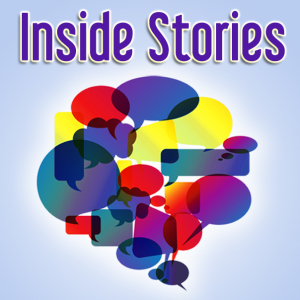 Annie Robinson (52 Posts)
Annie Robinson (52 Posts)Curator of Inside Stories and in-Training Staff Member
Columbia University
Annie Robinson completed a Master of Science in Narrative Medicine at Columbia University in 2014. She previously studied the healing power of stories as an undergraduate at NYU’s Gallatin School of Individualized Study.
Annie works as Narrative Coaching Specialist with Eating Disorder Recovery Specialists, helping individuals in the early stages of eating disorder recovery through mindfulness, meditation, yoga, and narrative practices. She is also the Program Officer at Health Story Collaborative, a non-profit that creates forums for individuals to tell their stories of personal health challenges, and curates another oral narratives projects called On the Road to Recovered: Voices from the Eating Disorder Recovery Community.
Annie is a coordinator and full-spectrum doula for The Doula Project in New York City, providing compassionate care for women during experiences of abortion, miscarriage, and fetal loss.
As a yoga teacher, writer, educator, and co-founder of NYC-based wellness community Pause, Breathe, and Connect, Annie shares her passion for integrative approaches to wellbeing. She is dedicated to creating spaces for people to explore the healing potential of interweaving of stories, spirituality, and somatic experience.
Inside Stories
Inside Stories is an oral narratives project which invites medical students to share their experiences in medical school in the form of brief podcasts published and archived on in-Training. The project aims to provide a means of personal healing, self-realization and empowerment through the sharing and receiving of personal stories, as well as to cultivate community among students in the often isolating medical school environment. The title Inside Stories reflects the project's mission to encourage students to go inside themselves and bring forth things that often go unspoken. It also represents the inside look listeners are granted into the sometimes private, challenging and confusing experiences students may have.
Made possible in part by a grant from the Arnold P. Gold Foundation and FJC.


How can doctors-in-training allow their personal experiences with loss and death to inform how they practice medicine? John, a fourth-year medical student in Philadelphia intending to become a psychiatrist, reflects on how his father’s long-drawn demise from Alzheimer’s influenced him.
How can doctors-in-training honor a patient’s experience as unique and significant, even as they become accustomed to witnessing suffering? Katie, a third-year medical student in New York who also holds a MFA in oil painting, shares some of the worries and questions she is grappling with on rotations.
Wearable technology is booming right now, Jawbone Up, Fuelbands, Fitbits, and even Samsung getting into the market. But what about medical wearables? Is there space for technology that creates continuous streams of clinical-grade data that health care professionals can utilize? And how can medical students get into that entrepreneurial space? We recently chatted with Raj Gokal, entrepreneur in residence at Rock Health, co-founder of Sano Intelligence, for the second in our five-part series about entrepreneurship.
How can doctors-in-training learn to relate to their patients in order to practice humanistic medicine? Aryanna, a fourth-year medical student in Texas going into family medicine, remembers a patient who showed her how much she could offer beyond physical medicine. She also reflects on how her multi-ethnic identity has influenced her journey in health care.
This episode is the first in a series on entrepreneurship in medicine. Our guest Shiv Gaglani is a student at both the Johns Hopkins University School of Medicine and the Harvard Business School. His ventures include the medical education company Osmosis and site Quantified Care. He’s also editor at Medgadget, a blog about medical technology. We sat down with him and picked his brain about what it’s like to fill gaps in medical education, be a medical student and entrepreneur, and more.
How can doctors-in-training act in accordance with their values through the challenging medical school experience? Bit, a first-year medical student with a background in positive psychology and an interest in studying empathy in clinical contexts, describes how she entered medical school with skepticism, yet has found ways to maintain her commitment to compassion.
How can doctors-in-training help each other remember what an honor it is to be a doctor? Joseph, a fourth-year medical student at Rush Medical College who hopes to enter a pediatric residency with a public policy focus and to pursue a hematology-oncology fellowship, shares his reflections after attending this year’s Gold Humanism Honor Society Biennial National Conference in Atlanta. He discusses changes that can be made to bring humanism to the fore in medical practice, and offers advice for others wishing to do the same.
There’s a lot going on social media regarding sharing information, discussion and, most importantly, authorship. The typical notion of publication in medicine — getting an article or paper in a prestigious journal with high impact factor — is falling to the wayside as the democratization of information renders researchers, physicians and medical students more accessible. We had a chance to talk with Ajay Major and Aleena Paul, two enterprising medical students from Albany Medical College, on how they are contributing to that movement. The duo are the founders and editors-in-chief of in-Training, our collaborators for this podcast, and are bent on creating a space online where medical student voices can be heard.
How can doctors-in-training actually practice medicine “narratively”? Daniel, a fourth-year medical student applying in pediatrics and a graduate of Columbia University’s Master of Science Program in Narrative Medicine, grapples with how to humanize the practice of medicine, especially while up against the limitations of effecting change as a medical student. He concludes with a poignant personal story about an unexpected encounter with a former patient on the streets of New York City.
How can doctors-in-training honor the voices of their patients, especially children’s voices? Trisha, a first-year medical student who aspires to become a pediatric oncologist, discusses her mission to give children with cancer the opportunity to be heard. She describes a project she developed inviting children to tell the stories of their illness, which she compiled into her book, “Chronicling Childhood Cancer: A Collection of Personal Stories by Children and Teens with Cancer,” that was published this month in honor of National Childhood Cancer Awareness Month.
As the health care landscape evolves in the coming years, how will academic medicine adapt? And what do these tectonic shifts in health policy mean for medical students? This week on History & Physical, we’re joined by Dr. Atul Grover, the Chief Public Policy Officer of the Association of American Medical Colleges (AAMC). Dr. Grover leads the public policy, strategy and outreach efforts that advance the work of the academic medicine community. He talks about the pact made between the government and academic medical centers to support medical graduate training, why so much innovation can come from medical colleges, and what students can do to advocate for their future.
How can doctors-in-training allow patients to directly contribute to their learning process? Laura, a second-year medical student pursuing dual medical and social science degrees, describes how, by asking her patients to walk her through their embodied experiences, she gains knowledge she cannot learn from textbooks. She also shares the joy she feels in serving not only as a diagnostician, but also as a guide through major life transitions.
 Annie Robinson (52 Posts)
Annie Robinson (52 Posts)Curator of Inside Stories and in-Training Staff Member
Columbia University
Annie Robinson completed a Master of Science in Narrative Medicine at Columbia University in 2014. She previously studied the healing power of stories as an undergraduate at NYU’s Gallatin School of Individualized Study.
Annie works as Narrative Coaching Specialist with Eating Disorder Recovery Specialists, helping individuals in the early stages of eating disorder recovery through mindfulness, meditation, yoga, and narrative practices. She is also the Program Officer at Health Story Collaborative, a non-profit that creates forums for individuals to tell their stories of personal health challenges, and curates another oral narratives projects called On the Road to Recovered: Voices from the Eating Disorder Recovery Community.
Annie is a coordinator and full-spectrum doula for The Doula Project in New York City, providing compassionate care for women during experiences of abortion, miscarriage, and fetal loss.
As a yoga teacher, writer, educator, and co-founder of NYC-based wellness community Pause, Breathe, and Connect, Annie shares her passion for integrative approaches to wellbeing. She is dedicated to creating spaces for people to explore the healing potential of interweaving of stories, spirituality, and somatic experience.
Inside Stories
Inside Stories is an oral narratives project which invites medical students to share their experiences in medical school in the form of brief podcasts published and archived on in-Training. The project aims to provide a means of personal healing, self-realization and empowerment through the sharing and receiving of personal stories, as well as to cultivate community among students in the often isolating medical school environment. The title Inside Stories reflects the project's mission to encourage students to go inside themselves and bring forth things that often go unspoken. It also represents the inside look listeners are granted into the sometimes private, challenging and confusing experiences students may have.
Made possible in part by a grant from the Arnold P. Gold Foundation and FJC.






